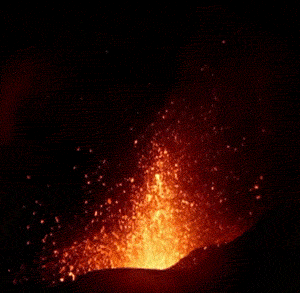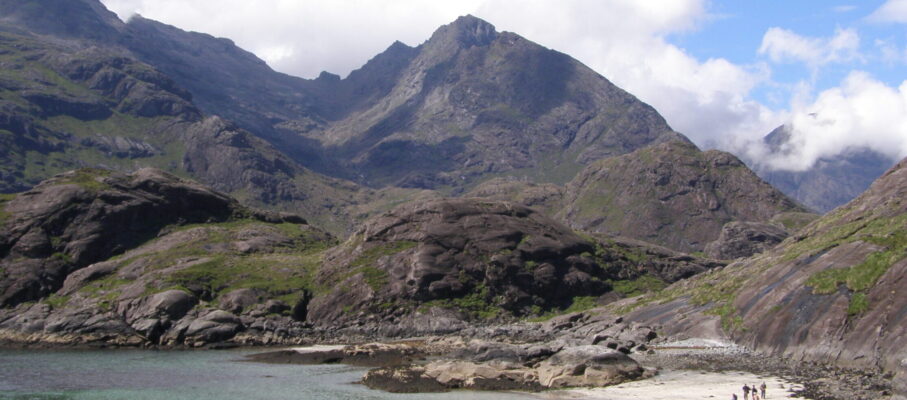
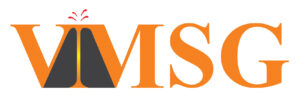
Hello VMSG. Welcome back to a new year of VMSG Newsletters! Firstly, I’d like to thank Ailsa Naismith for her sterling efforts over the past three years in making the VMSG newsletter such a great resource or the community. I’ll do my best to keep up the good work! And on that note, please get in contact with me at any time if you have items you’d like to share in the next newsletter. I’ll keep you informed with news from the VMSG committee, but if there’s anything else you’d like to broadcast to the British and Irish volcanology and petrology communities (and beyond) do let me know.
In this edition we’ll hear a bit about the 60th anniversary VMSG2024 meeting at the University of Bristol, the joint VMSG2025 meeting with MDSG in Dublin as well as details about the European Mineralogical Conference (EMC 2024) and 1st International Conference on Volcanic & Igneous Plumbing Systems (VIPS) happening this summer that will be of interest to lots of people in our community. There are also details about this year’s VMSG Awards, as well as VMSG Student Bursaries and the Henry Emeleus Fieldwork Award that are now open for applications. We’ve also got some introductions from new VMSG committee members who joined in January. – David Neave
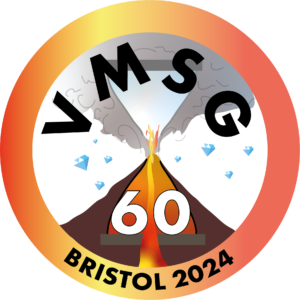 Barely into the new year, the volcanic community was already seething with activity! The University of Bristol played host to the 2024 annual meeting of the VMSG (3-5 January 2024), bringing together volcanologists, petrologists, and magma-fanciers from all parts of the UK and Ireland. Although hosted in the Chemistry department, it was Bristol’s Volcanology group who organized and hosted the meeting, spearheaded by Dr Pete Rowley. This year’s VMSG was particularly special as it marked the 60th anniversary of the group. To mark the occasion, we had a keynote talk by Professor Sir Steve Sparks reflecting on 60 years of VMSG … and looking forward to the next 60+ years. The talk was followed by dinner in the Great Hall. To round out the Bristol experience, the meeting was followed by the Bristol Volcano Art & Film Festival at the Watershed, featuring an outreach sandwich of Into The Inferno – volcano displays in Waterside 2 – Lava Bombs (Friday night) and a field trip to the Sand Bay volcanics sequence near Weston-super-Mare on the following Saturday.
Barely into the new year, the volcanic community was already seething with activity! The University of Bristol played host to the 2024 annual meeting of the VMSG (3-5 January 2024), bringing together volcanologists, petrologists, and magma-fanciers from all parts of the UK and Ireland. Although hosted in the Chemistry department, it was Bristol’s Volcanology group who organized and hosted the meeting, spearheaded by Dr Pete Rowley. This year’s VMSG was particularly special as it marked the 60th anniversary of the group. To mark the occasion, we had a keynote talk by Professor Sir Steve Sparks reflecting on 60 years of VMSG … and looking forward to the next 60+ years. The talk was followed by dinner in the Great Hall. To round out the Bristol experience, the meeting was followed by the Bristol Volcano Art & Film Festival at the Watershed, featuring an outreach sandwich of Into The Inferno – volcano displays in Waterside 2 – Lava Bombs (Friday night) and a field trip to the Sand Bay volcanics sequence near Weston-super-Mare on the following Saturday.
We were chuffed to welcome almost 200 in-person delegates (and more online) to Bristol for conversation, exchange, and culture. Overall there was a 11:9 split between students and non-students that was mirrored in those who gave the 43 oral presentations. In addition, 115 posters were presented, which must be close to a VMSG record! The gender split between female and male identifying delegates was 11:9, and beyond the main conference, 55 people participated in the pre-conference workshops, and 23 in the post-conference fieldtrip.
We hope it will be remembered as a fitting event to celebrate 60 wonderful years of investigating volcanoes and building a community devoted to this aim. – The Bristol LOC (Ed: a big thanks to everyone in Bristol for organising a such a successful meeting!)
Every year VMSG confers awards on members right across our community. You can find more about the awards here. This year we were thrilled to celebrate the following awardees in Bristol.
The Thermo Fisher VMSG Award: Clive Oppenheimer (University of Cambridge, left)
The Zeiss Post-doctoral Keynote Award: Martin Mangler (Durham University, middle)
The Willy Aspinall Award: Edna Dualeh (University of Leeds, right)
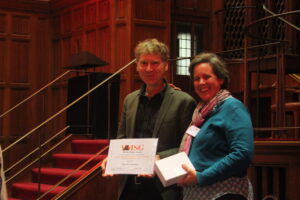
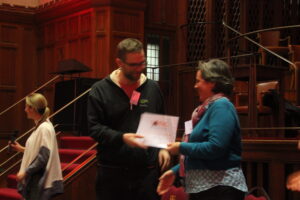
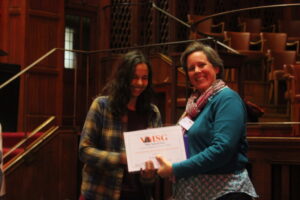
Amongst stiff competition from lots of excellent contributions we were also pleased to make the following awards for student presentations:
The Geoff Brown Prize for Best Student Poster: Ceri Allgood (Durham University)
Honourable mentions: Tianyuan Zhi (University of Bristol) and Emma Hadré (Kiel University CAU)
The Bob Hunter Prize for Best Student Oral Presentation: Tegan Havard (University of Liverpool)
Honourable mention: Janina Gillies (Durham University)
Well done to all of this year’s winners, and a quick reminder from the committee that we can only make awards if we get nominations! So please do think about who is making major contributions to our science and community and consider nominating them for one of our awards, or indeed an award from another body like the GeolSoc or MinSoc, especially if they are yet to receive the wider recognition they deserve! – VMSG Committee
As part of VMSG’s 60th anniversary celebrations, we’re excited to be running a series of seminars throughout 2024 on topics spanning the full range of VMSG science! We’re hoping to run about ten seminars in total, with Prof Sir Steve Sparkes having got us started in Bristol in January. The seminars will be taking place across Britain and Ireland, so hopefully you’ll be able to catch one or two in person. We’re also planning to stream the seminars so everyone has a chance to join in.
At the moment the following venues, dates and times have been confirmed:
Stay tuned via the VMSG mailing list for more information soon. – VMSG Committee
Partly sponsored by VMSG, I had the privilege to participate in the Cities on Volcanoes 12 conference held in Antigua, Guatemala, where around 600 people presented their works as posters or talks. The conference took place from the 10th to the 17th of February 2024. The main topics were diverse, including monitoring volcanoes; hazards and impacts of volcanoes on populations and how to deliver this information; art and volcanoes; and the perception of populations living near volcanoes. Thanks to the diversity of topics, I realised the impact of volcanologists and scientists on society. Personally, I delivered a 12-minute talk in the session titled “409: Multi-scaled and multi-parametric geodetic monitoring and modelling for studying and forecasting volcanic activity”.
The conference organised different field trips, and I participated in two. The first involved visiting Pacaya Volcano to learn about its eruptive history, and the second, held at the end of the conference, involved hiking to Acatenango Volcano to observe El Fuego Volcano, which is one of the most active volcanoes in Guatemala. During these trips, we learnt about the volcanic activity of these volcanoes and spoke with people who witnessed and experienced the last major eruption in 2018 of El Fuego Volcano.
Moreover, COV12 organised various pre- and post-conference workshops, and I participated in one named “Exploring communication strategies between volcano observatories and international partnerships.” This workshop provided me with new perspectives on people working in observatories and how to handle sensitive data without produce conflicts.
Attending this conference was a significant opportunity for me as I could meet and talk with scientists and volcanologists working on my topic, especially those working in South America. In that sense, I met people working at the Chilean Volcanic Observatory (OVDAS), which was very important to me as I am from Chile. Additionally, as different speakers exposed about stories of how much people were affected by different eruptions in the past was very inspirational and makes comprehend the important labour of studying volcanoes. So, it provided me with considerable motivation, fresh concepts, and valuable connections crucial for my forthcoming research endeavours. Finally, the conference was bilingual, with talks given in Spanish and English, which was very helpful for me as a Spanish speaker to reach and connect with other Spanish speakers. – Josefa Sepúlveda (University of Leeds)
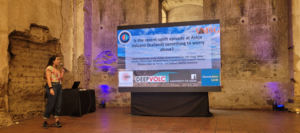
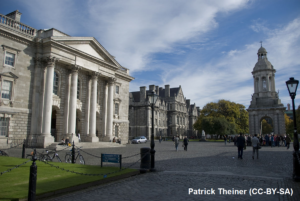
The next VMSG Annual Meeting will be held on 6-8 January 2025 in Trinity College Dublin.
This will be a one-off joint meeting with the Mineral Deposits Studies Group (MDSG), with a combination of joint and parallel sessions.
The conference will include a series of workshops, fieldtrips and events looking at academic-industry collaboration, and attendees will have an opportunity to experience Irish culture from the historic city centre location!
Keep your eyes open for more news about this exciting meeting later in the year! – The Dublin LOC
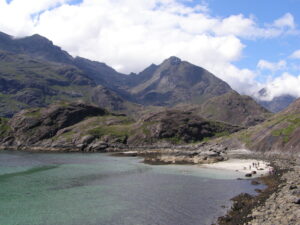 The next round of VMSG Student Bursaries and the Henry Emeleus Fieldwork Award are now open and accepting applications until 15 March 2024.
The next round of VMSG Student Bursaries and the Henry Emeleus Fieldwork Award are now open and accepting applications until 15 March 2024.
We have recently reviewed the processes around award nomination, eligibility and decision-making for all VMSG funding. The purpose of this review was to streamline the application process, ensure funding is accessible to those who would benefit most, clarify eligibility for all awards, ensure fairness and encourage diversity.
Please check the new guidelines and application forms for all awards, as these have changed.
Student bursaries
These bursaries are intended to assist doctoral researchers who wish to present their work at a national or international conference/workshop (either as virtual or in-person attendance), carry out fieldwork for their research, or travel to use laboratory facilities in the UK or overseas (please note only travel costs are eligible, not instrument time or bench fees). Bursaries are awarded up to a maximum of £500. This round of applications is intended to support travel between 1 May 2024 and 30 April 2025.
Henry Emeleus Award
This fieldwork fund is intended to support early career researchers to undertake fieldwork, particularly research related to the Paleogene North Atlantic Large Igneous Province. Funding is awarded up to a maximum of £1000.
Application process
Full details and the application forms for both these funds are available on the VMSG website:
https://vmsg.org.uk/awards/henry-emeleus-fieldwork-grant
https://vmsg.org.uk/community/students/student-bursaries
Please send your application form electronically to the VMSG Awards and Bursaries Officer (Emma Nicholson) putting “VMSG Student Bursary Application” or “VMSG Henry Emeleus Application” (as applicable) as the title of your email. – VMSG Committee
The Mineralogical Society of the UK and Ireland (VMSG parent body) is leading the organization of the fourth European Mineralogical Conference (EMC 2024). This event will be held at Trinity College Dublin on 18-23 August 2024. It includes the sessions along with many others of interest to the VMSG community:
The conference website can be found at www.emc-2024.org; the early-bird registration deadline is 31 March 2024.
The organizers look forward to welcoming you to Dublin. – David Chew and Emma Tomlinson, Trinity College Dublin

We are delighted to announce that the 1st International Conference of the IAVCEI Commission on Volcanic & Igneous Plumbing Systems (VIPS) will take place in 2024 in Liverpool, United Kingdom. This event is being hosted by the MAGMA lab at the University of Liverpool, from 18-20 June 2024. There are more details here.
The conference will entail three days of workshops, academic talks, posters, and other exciting activities. Provisional talk/poster session themes for an in-person and virtual participation include:
Potential specialist workshops for in-person attendees include:
Please don’t hesitate to contact us at the following email address if you have any questions about the conference: liverpoolMagmaLab@liverpool.ac.uk
We look forward to welcoming fellow VIPS enthusiasts in Liverpool. – VIPS conference local organising committee

There have been some changes in the VMSG Committee as of January 2024, with three of us joining the committee.
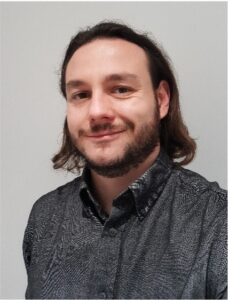 “I work as Earth Risk Research Lead within the WTW Research Network, part of insurance broker and risk advisory firm WTW. My role comprises facilitating research collaboration with academia, think tanks, non-profit organisations and industry-based research organisations in fields relating to geohazards, such as volcanic, seismic, landslide and tsunami risk. I also help to test, validate and compare hazard and risk modelling platforms. I publicise the research within these fields to teams across WTW, connecting academics with industry persons such as catastrophe modellers and risk advisors who use their research in a practical environment. As part of VMSG’s committee, I’m excited to use my position to help further publicise the group within the wider geoscience community, assist students and recent graduates better understand career options and opportunities available to them, and strengthen links between academic researchers and the insurance industry.”
“I work as Earth Risk Research Lead within the WTW Research Network, part of insurance broker and risk advisory firm WTW. My role comprises facilitating research collaboration with academia, think tanks, non-profit organisations and industry-based research organisations in fields relating to geohazards, such as volcanic, seismic, landslide and tsunami risk. I also help to test, validate and compare hazard and risk modelling platforms. I publicise the research within these fields to teams across WTW, connecting academics with industry persons such as catastrophe modellers and risk advisors who use their research in a practical environment. As part of VMSG’s committee, I’m excited to use my position to help further publicise the group within the wider geoscience community, assist students and recent graduates better understand career options and opportunities available to them, and strengthen links between academic researchers and the insurance industry.”
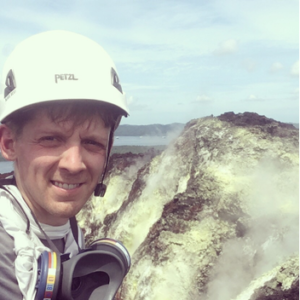 “I am a volcanologist and lecturer at the University of Manchester, in the Department of Earth and Environmental Sciences. My research focusses on volcanic gas emissions and magmatic volatiles. I investigate the geological processes which govern changes in the composition and emission rate of volcanic emissions across a range of spatial and temporal scales, from subduction zone volatile recycling, to changing outgassing as a function of unrest, to the influence of exsolved volatiles on the physical properties of magmas in crustal reservoirs. I have been attending VMSG meetings since 2010 and am looking forward to giving back to a community that has been a source of support, friendship and scientific collaboration over many years.”
“I am a volcanologist and lecturer at the University of Manchester, in the Department of Earth and Environmental Sciences. My research focusses on volcanic gas emissions and magmatic volatiles. I investigate the geological processes which govern changes in the composition and emission rate of volcanic emissions across a range of spatial and temporal scales, from subduction zone volatile recycling, to changing outgassing as a function of unrest, to the influence of exsolved volatiles on the physical properties of magmas in crustal reservoirs. I have been attending VMSG meetings since 2010 and am looking forward to giving back to a community that has been a source of support, friendship and scientific collaboration over many years.”
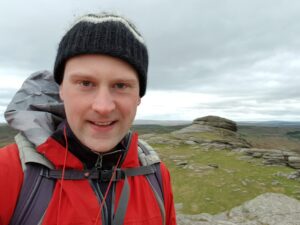 “I’m a Senior Lecturer and NERC IRF at the University of Manchester. My research aims to understand the behaviour and evolution of magmatic systems from the generation and diversification of melts at depth through to their eruption at the surface. I combine experiments and the study of natural examples to understand magma storage and assembly within the crust, and the transfer of melts, crystals and volatiles to and from planetary interiors. I have attended almost every VMSG meeting since I started my PhD in 2010, and I am very excited to join the committee of a society that has both greatly supported my development as a researcher and been a source of much fun over the past decade. I’ll strive to keep up Ailsa Naismith’s good work with the newsletter and support the rest of the committee to ensure VMSG’s ongoing success.”
“I’m a Senior Lecturer and NERC IRF at the University of Manchester. My research aims to understand the behaviour and evolution of magmatic systems from the generation and diversification of melts at depth through to their eruption at the surface. I combine experiments and the study of natural examples to understand magma storage and assembly within the crust, and the transfer of melts, crystals and volatiles to and from planetary interiors. I have attended almost every VMSG meeting since I started my PhD in 2010, and I am very excited to join the committee of a society that has both greatly supported my development as a researcher and been a source of much fun over the past decade. I’ll strive to keep up Ailsa Naismith’s good work with the newsletter and support the rest of the committee to ensure VMSG’s ongoing success.”
EGU General Assembly 2024, Vienna, 14-19 April 2024, early registration deadline of 18 March 2024, website
1st International Conference of the IAVCEI Commission on Volcanic & Igneous Plumbing Systems (VIPS), Liverpool, 18-20 June 2024, website
Goldschmidt 2024, Chicago, 18-23 August 2024, abstract submission deadline of 29 March 2024, website
European Mineralogical Conference (EMC 2024), Dublin, 18-24 August 2024, abstract submission deadline of 22 March 2024, website
AGU Fall Meeting 2024, Washington D.C. 9-13 December 2023, session proposals in March 2024, website
Do you have any job opportunities, PhD viva celebrations, or funding announcements that you would like to advertise? If so, please get in touch with David Neave.
Don’t forget to keep in touch with us and other volcanologists around the world. There are several ways you can do this: through the VMSG PhD and ECR directory (here), the Arizona State University mailing list (here), and the VMSG mailing list (here).
